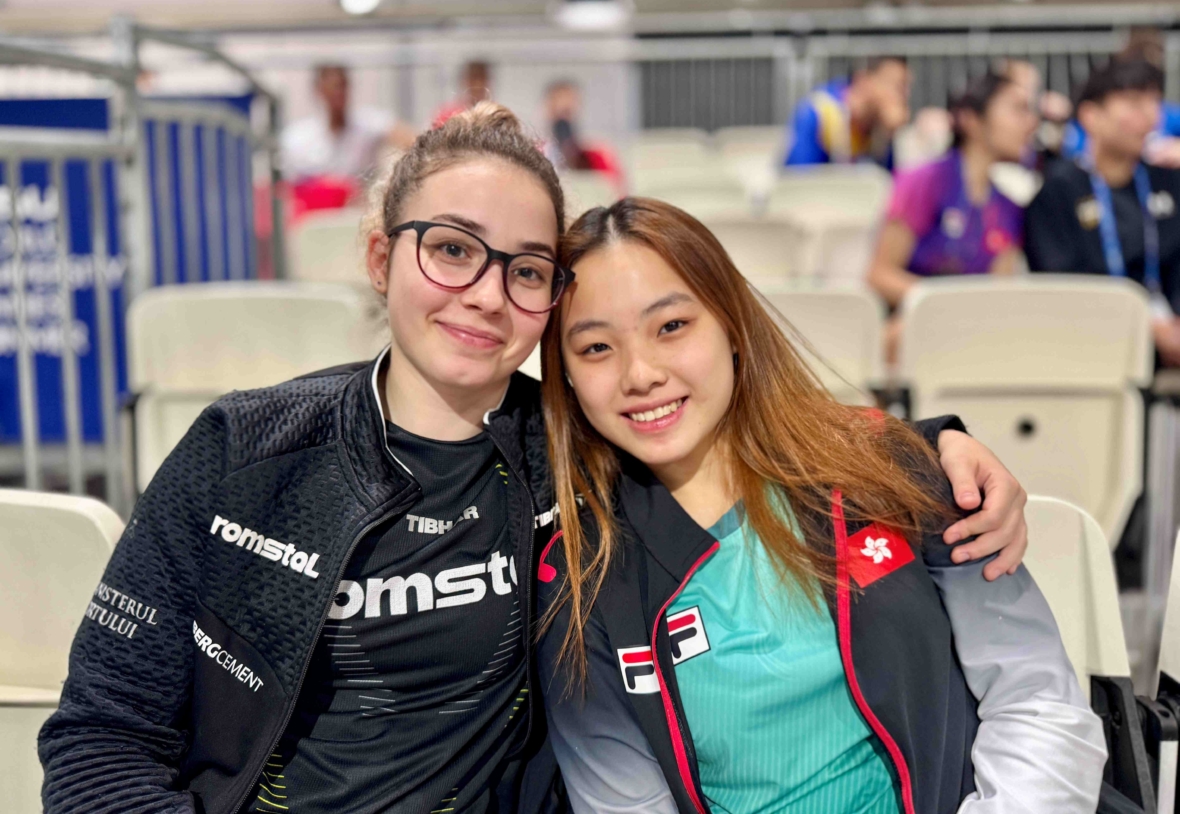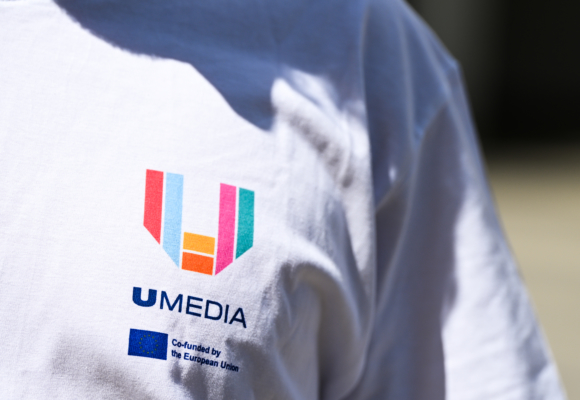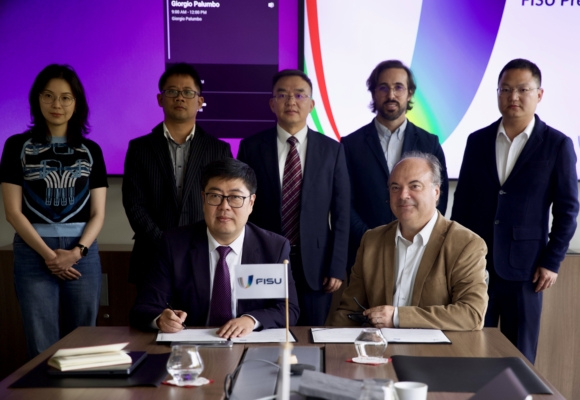On Thursday, 24 July, as table tennis concluded its final day at the Rhine-Ruhr 2025 FISU World University Games in Essen, two athletes from different countries sat side by side in the stands—not as rivals, but as something far more unexpected.
One is from Hong Kong China, the other from Romania. While most players huddled with their national squads, these two chose each other—sharing a bench, stories, and a bond that stretched far beyond flags or uniforms.
Their names are Hoi Tung Wong, 19, a business student at the University of Hong Kong, and Ioana Sîngeorzan, 21, a sports major at the University of Craiova in Romania.
From rivals to roommates
Their first encounter wasn’t particularly friendly. At the 2021 World Junior Championships in Portugal, Sîngeorzan’s Romanian team defeated Wong’s Hong Kong China squad in the quarterfinals.
“I was so angry,” Wong recalled with a laugh. “I hated her—but I remembered her.” They crossed paths again in 2023 at a youth tournament in Qatar—still on opposite sides of the table, and little more than familiar faces.
But everything changed in late 2024 when both unknowingly signed with the same club in the Polish League and ended up as roommates.
“We had never actually talked before,” Sîngeorzan said. “But from the very first day, something clicked. We just started laughing—and never really stopped.”
What began as a rooming arrangement quickly grew into a partnership—and then into something deeper. They practiced together, supported each other on match days, and shared meals, jokes, and long conversations about everything from table tennis to bubble tea.
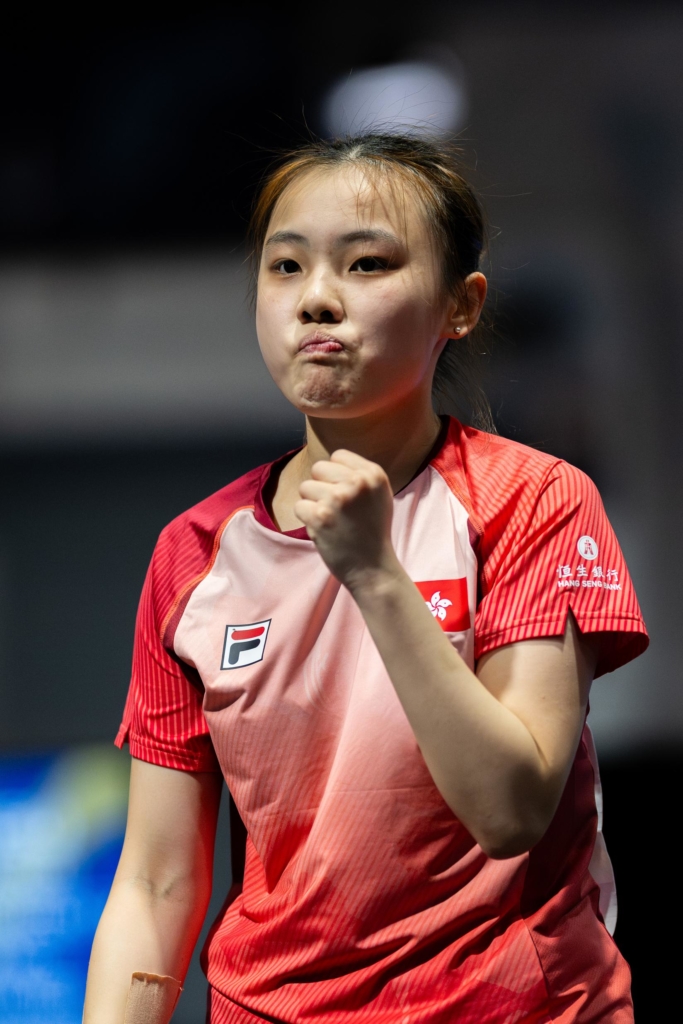
A surprising connection
One of their favourite shared stories began with a simple question: “So, how did you start playing table tennis?”
Sîngeorzan answered first: “Because of my brother. He’s two years older.”
Wong’s eyes widened. “Wait, seriously? Same!” The two burst out laughing.
Both had older brothers—exactly two years older—who inspired them to pick up a paddle. What started as a funny coincidence soon felt like something more.
“It’s little things like that,” said Wong, “that make it feel like we were meant to meet.”
Opposites in perfect balance
Sîngeorzan is focused, fiery, and fiercely competitive. Wong is relaxed, cheerful, and endlessly optimistic. They approach both sport and life in very different ways. Wong jokes that she rolls out of bed fifteen minutes before training, while Sîngeorzan wakes up early to stretch, eat properly, and mentally prepare.
Wong unwinds by watching videos on her phone; Sîngeorzan prefers going for a run. And when matches go badly? “She cries,” said Wong, grinning. “I laugh. She thinks I’m crazy.” “She is,” Sîngeorzan smiled. “But in the best way.”
They support each other, coach each other, and sometimes challenge each other—like when Sîngeorzan once trained through a fever and ended up too sick to play.
“I told her not to,” said Wong. “She was right,” Sîngeorzan admitted.
Their connection even turned professional at times. At a tournament in Kosovo earlier this year, when Wong was without a coach, Sîngeorzan stepped in. “She plays with so much emotion—sometimes I forget I’m supposed to give tactical advice,” she said, laughing.
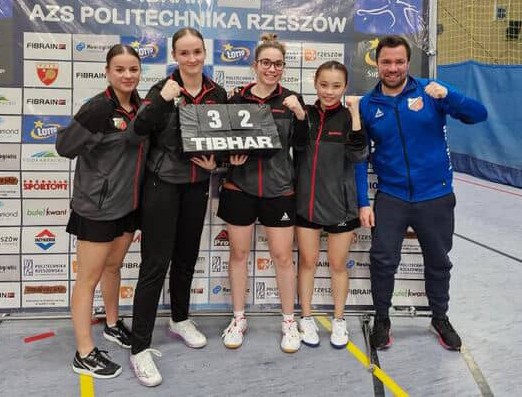
Not Just a season
When the Polish League season ended, both had choices to make. Sîngeorzan renewed her contract. Wong received an offer from another club —but turned it down.
“I told them I wasn’t leaving,” she said. “Because my team is here. She’s here.”
Now, their dream stretches beyond the table tennis campaign. They hope to visit each other’s homes, train in Hong Kong, explore Romania, and maybe, one day, play doubles together.
“Even if we end up playing each other in a final,” said Sîngeorzan, “I won’t be upset if I lose. I’ll be proud—because it’s her.” “And I’ll make her drink real Hong Kong bubble tea,” added Wong with a grin. “Three cups a day.”
More than a match
In a sport where milliseconds and millimetres can decide victory or defeat—where athletes often travel alone and train in silence—Wong and Sîngeorzan found something few competitors ever do: someone who truly understands. Someone who lifts you up when you’re down. Someone who laughs at your worst jokes, celebrates your smallest wins, and stays—long after the match ends.
They came to Germany to compete. They leave with something better.
Now, they dream of visiting each other’s homes—and one day exploring Argentina together, a country that belongs to neither Asia nor Europe, but somewhere beautifully in between. A fitting place, they joke, for a friendship with no borders.
In a tournament full of rallies, some of the most powerful moments didn’t happen on the table—but beside it.
In the Rhine-Ruhr 2025 women’s singles tournament, the two friends bowed out in the round of 32. The singles gold medals went to Zhao Shang from the People’s Republic of China in women’s competition and neutral athlete Vladimir Sidorenko on the men’s side.
The Rhine-Ruhr 2025 FISU World University Games take place from 16-27 July. Watch all the competitions live on fisu.tv. Click on the link to find the full schedule.
Written by Soyoung Bang, FISU Young Reporter, Korea
The Young Reporters Programme exemplifies FISU’s commitment to more than sports competitions. At every FISU World University Games, a group of talented aspiring sports journalists are chosen to cover the competition.

We warmly thank FISU Official Partner Qiaodan Ltd. which provides remarkable uniforms to FISU Family and International Technical Officials since 2015. Qiaodan is a valuable partner for FISU as it continued to provide its support during the postponement of events due to the global pandemic, and recently extended the relationship with FISU up to and including 2025.
